|
I'm sure there's a mathematical formula in film storytelling that can be summed up thus: the more isolated a community, the more likely it is to be dangerous to outsiders. There is a certain real world logic to this. Small and cut-off communities are more likely to be close-knit and share a unified world view that does not always chime with popular opinion, and their ways and traditions may be different from ours. At our most condescending we regard them as quaint, while at our least understanding we react with distaste or even fear. If the people in question take a dislike to you for whatever reason, then that fear has some grounding. You are, after all, on effectively alien turf. The chances are you don't know your way around the place or its customs, which makes it all too easy to unintentionally upset the locals. And there are a lot more of them than there are of you.
Wake in Fright, a previously too-little-seen 1971 Australian film directed by Canadian Ted Kotcheff, arrives on UK shores, restored and rescued from virtual obscurity, with some serious baggage. The title alone creates certain expectations, which are given a hugely anticipatory edge by the press release quote from singer, songwriter and screenwriter Nick Cave, who called it "The best and most terrifying film about Australia in existence." Words like "terrifying" have very specific connotations, which for me were cranked up a notch by the Twitter posts I read claiming that the experience of watching it leaves the horrors of films like Wolf Creek flapping around in the outback dust. Adding to all this are the synopses that make it sound like an early take on the likes of Red Rock West or U-Turn, where an ordinary individual finds themselves on unfamiliar turf and encounters hostility and the threat of violence at every turn. All of which is utterly misleading and could have you expecting a very different film from the one you'll actually get. And what you get is really something.
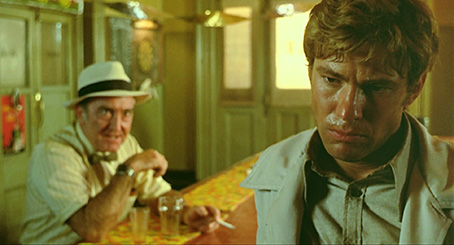
John Grant (an excellent Gary Bond) is a teacher who has been posted at a breathtakingly isolated one-room schoolhouse in the Australian outback. It's now the Christmas holidays, high summer in Australia, and he's heading to Sydney to spend it with his girlfriend. The journey involves staying a single night in the cut-off mining town of Bundanyabba, known to locals as the Yabba, before catching a plane to Sidney the following morning. Here, he meets police chief Jock Crawford (a commanding Chips Rafferty in his final role), who has a few drinks with him, tells him about the town, and shows him where he can get a good steak. It's here that John is introduced to a game known as two-up, where big money can be made or lost on a dual coin toss. John gives it a go and repeatedly strikes lucky, but instead of quitting while ahead, he is seduced by the prospect of making enough money to pack in his teaching job and ends up losing all his winnings and his final pay cheque. Now effectively destitute, he is befriended by Tim (Al Thomas), who buys him a few beers and then invites him to his house, where the drinking continues, later in the company of Tim's friends Dick, Joe and Doc (Jack Thompson, Peter Whittle and a superb Donald Pleasance). Initially uncomfortable in the company of this hard drinking and loudly masculine group, John is pressured into accepting their hospitality and gradually finds himself losing his grip on the man he thought he was.
The concept that just about anyone has the capacity to descend into savagery if starved of the essentials of so-called civilised society has been a favourite with authors and filmmakers over the years, and has its flag-bearer in William Golding's seminal Lord of the Flies. Here, it's not so simple. John is not imprisoned, beaten or gang-raped. He's treated as a friend by people whose idea of a good time merely differs considerably from his own. I'd even go as far as to suggest that the Yabba's citizens' honesty and willingness to share has an almost utopian quality, particularly viewed from a time in which the very concept of community and caring for others is in terminal decline. In the Yabba, if you win a pot of money at two-up but can't fight your way though the crowd to collect it, then you needn't worry because one of the other gamblers will find you and put it in your hands. Leave your unlocked suitcases in a bar and disappear for two days on a heroic bender and they'll still be there unmolested when you return. And if you have no money, then there are always others who will buy you beer, fix you up with some food and a place to sleep, and ask for nothing in return except your companionship. When you have money at a later date, they reason, then it'll be your turn to buy the drinks. It's a philosophy I've been living by all of my adult life and thus instantly warmed to here.
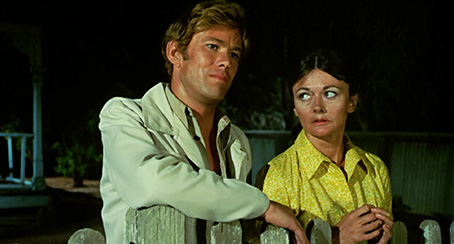
The problem for John is that while the locals drink to be sociable, they seem to be sociable twenty-four hours a day, in part because there's precious little else to do. To the men of the Yabba, beer is as essential to their existence as oxygen and is consumed at a similar rate. It's a relationship defined by Doc when he tells John, "I'm a doctor of medicine. And a tramp by temperament. I'm also an alcoholic. My disease prevented me from practicing in Sydney. But out here it's scarcely noticeable." To the outsider this all seems self-destructive, but to the Yabba boys it's a way of life, to the point where even politely declining the offer of a drink is taken as an insult. When John seeks respite from the boozing at Tim's house by conversing with his dour-faced and desperate daughter Janet (played by Sylvia Kay, then Ted Kotcheff's wife), Jack is bemused: "What's the matter with him? He'd rather talk to a woman than drink?"
This is a community in which the men outnumber the women by something like three-to-one (an imbalance that looks to be a lot more extreme than that here), and a time and place when women still had to fight to be heard and men were defined by their perceived masculinity. As a result, women are effectively excluded from all aspects of this male micro-society, and hover on the periphery in service jobs or as glumly accepting wives and daughters. It's one of the real strengths of the film that the Yabba boys' sexism is not overtly displayed, but shown to be an almost organic component of this male-run community. Blokeism rules, and with little chance of forming a meaningful relationship with a member of the opposite sex, the men find companionship and camaraderie with each other and experience physical contact through roughhouse brawling.
And I kind of get it. A few years back I even have a feeling that I'd have fitted right in here. A close friend and I used to drink every bit as heavily as the Yabba boys, not to drown our sorrows, but because we just loved boozing and enjoyed the sensation of being falling-down pissed. We'd get into fights, usually with each other, and intermittently we'd wake up on some floor or other after all but collapsing where we fell the night before. And at the time, at least, we didn't regret a moment. Of course, with hindsight I'm aware that had I continued to consume alcohol at this foolish rate it would have eventually landed me in hospital, prison or worse. Frankly it's a small miracle that our drunken escapades did not land us in more trouble than it did, and I'm still surprised that even one of us made it out this period alive. The other, I should note, did not.
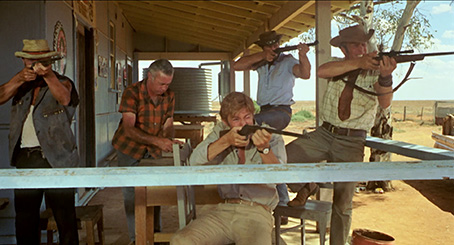
It's perhaps this empathy-though-experience that's behind my surprise at the extremity of some of the critical responses to the nature and behaviour of the Yabba boys, which on more than one occasion I've seen described as "debauched". You'll have to forgive my slightly contrary viewpoint, but there's a sense in some of these comments of a middle class intellectual fear of, and perhaps even disgust at, what they see as the plebeian in themselves and society at large. Of course, the ante is seriously upped when the boys take John on a kangaroo hunt, a genuinely shocking sequence that will likely have the sensitive burying their faces in cushions, and with good reason. Yet even this cannot be considered deviant behaviour in the context in which the film is set, as evidenced by the fact that Kotcheff and his crew secured the footage they required by accompanying a fully cooperative group of genuine hunters on a real kangaroo shoot. The Yabba boys here are men with guns and no creative outlet for their pent-up machismo, and in a community this isolated and unified in its worldview, there are no credible challenges to their self-defined concepts of right and wrong.
That I'm able to suggest this more balanced view of people that others have painted as a collective amoral nightmare is very much down to Kotcheff's even-handed and non-judgemental approach. He never overtly demonises the Yabba boys, any more than he attempts to idealise John – he just observes them and their behaviour in a manner that feels refreshingly honest and real, then leaves it to us to pass judgement on their attitudes and actions. This level of balance even extends to the film's night-time kangaroo hunt, for while the shoot itself will have all but the most callous sucking airthrough their teeth, the bone-rattling car chase that leads up to it is exhilaratingly filmed, a direct reflection of John's alcohol-fuelled excitement at this wild cross-desert dash. So seduced is he, indeed, by the adrenaline rush and the unbridled energy of his fellow hunters that he enthusiastically participates in the killing, right up to the moment that he's pressured by his companions into going head-to-head with a wounded kangaroo where, in what has to be the film's most disturbing image, his initial apprehension descends into feverish and uncontrolled bloodlust.
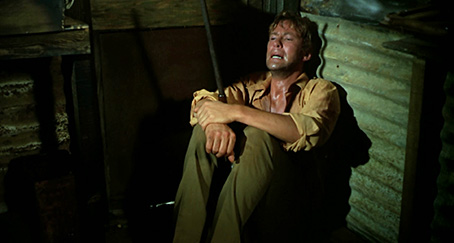
Although clearly saddled with issues of his own and a belief that he is a cut above the Yabba locals and the hand that life has dealt him, we side with John regardless because the story is told entirely from his point of view. His fateful final spin of the coins may play out to expectations, but it's easy to feel for the guy once he's flat broke and stranded on unfamiliar turf with no obvious allies. And his discomfort in the company of those with whom he has precious little in common is infectious because we've probably all been there at one point or another. It's this empathic bond (no pun intended), coupled with the conviction of Gary Bond's performance and Kotcheff's precise direction, that makes John's downward spiral so damned compelling. Kotcheff doesn't just observe John's implosive descent, he makes us part of it. And nowhere is this engagement with character and fate more vividly realised than the late film image of John stumbling through the centre of town, spaced-out and bedraggled and carrying the rifle presented to him by his fellow hunters, looking for all the world like something that has escaped from his own nightmares. As his perception of his surroundings and his own identity begins to collapse on itself, a dryly jocular earlier exchange with Jock about a sure-fire way of escaping from the Yabba comes back to haunt the action that he subsequently takes.
As Narciso Ibáñez Serrador's 1976 Who Can Kill a Child? [¿Quién puede matar a un niño?], which was also released in the UK by Eureka Entertainment, it's hard to believe that a film as striking and effective as Wake in Fright has been off the radar for so long. It's an immaculately made work, but never deliberately showy, with every shot and edit imbued with a clear sense of purpose. Even the consistently warm colour scheme is part of Kotcheff's thinking, allowing us to feel rather than just observe the unrelenting heat that helps drive the locals to drink.
As a portrait of the fragility of what we precariously define as civilisation, Wake in Fright makes for gripping and ultimately sobering viewing. It also serves as a potent reminder of the insidiously persuasive nature of group peer pressure, particularly when lubricated by alcohol or drugs, and the potentially damaging consequences of submitting to it. Yet the film still has the balls to suggest that for all its moral horrors, the effects on John of this lost weekend may not have been exclusively negative, as illustrated by a bookend moment involving a proffered can of beer (see it to get it – I'm already in potential spoiler territory). It's a message I found easy to relate to through my own alcohol-fuelled period of near self-destruction – I lost a lot, including my closest friend, but in the end it still helped to shape the person that I later became. And for all his many faults, I still kind of like him.
This 1.85:1 digital restoration was conducted by Atlab/Deluxe for the National Film and Sound Archive, Australia, and the results are rather lovely, particularly the reproduction of the deliberately warm colour palette of Brian West's cinematography and Dennis Gentle's production design. The film's editor, Anthony Buckley, pays tribute to the quality of this restoration on the commentary and in the accompanying booklet by assuring us that it brings out picture detail that was previously invisible on the photochemical prints used for cinema distribution. Sharpness is very good and the balance of the contrast has been nicely judged – on the night-time shot of John and Janet on the porch of Tim's house, the black of night is rock solid, and despite being lit by a harsh porch light, the detail on John's white jacket is clearly defined. The image is virtually spotless, with no sign at all of previous damage, and the brightness of the exteriors subtly captures British cinematographer Brian West's comment to Anthony Buckley on first arriving in Australia: "My God, this country's one stop overexposed!"
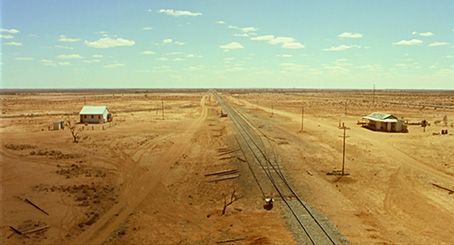
The Linear PCM mono track is also in good shape, having a reasonable dynamic range and a clarity that captures the film's evocative use of sound (the buzzing of flies when John wakes after a particularly memorable night in Doc's cabin is a good example) and does well by the more disorientating strains of John Scott's fine score.
English SDH subtitles are also available.
Commentary with director Ted Kotcheff and editor Anthony Buckley
Recorded in 2009, I'm guessing for an Australian DVD release, director Ted Kotcheff and editor Anthony Buckley provide a detailed and consistently fascinating commentary on almost every aspect of the film's production. A lot is covered here, including the actors, the locations, the purpose of individual scenes and actions, the kangaroo hunt and a ton and a half more. There are plenty of anecdotes about filming in the town of Broken Hill (Kotcheff himself got hooked on two-up; guys in bars regularly challenged him to fights; women were excluded and often ignored), Buckley talks about the difficulty of editing a scene in which Donald Pleasance kept swapping the hand he drank with, and Kotcheff tells a lovely story about the Cannes screening where he was sitting in front of a very excited young Martin Scorsese. There's loads more here. A splendid companion to the film. Ted Kotcheff Interview (23:16)
A most engaging interview with the amiable Ted Kotcheff that does tend to cover the same ground as the commentary, sometimes in almost the same words, though it does provide more detail on background of the real-life kangaroo hunt.
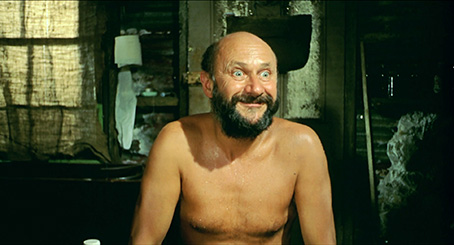
Who Needs Art? (5:36)
What looks like a five minute extract from a longer (TV?) documentary that covers the production of Wake in Fright, the first feature film to be made in Australia in the 1970s. There's some brief but welcome behind-the-scenes footage and very British producer George Willoughby talks it up as an Australian film, despite its international cast and crew. He even expresses the hope that it will be Australia's entry in the Cannes Film Festival, which of course it was. The piece is rounded off by critic and filmmaker Philip Adams expressing a pessimism for the future of Australian cinema, tragically unware that the internationally acclaimed Australian New Wave lay just around the corner.
Chips Rafferty Obituary (3:28)
Director Ken G. Hall pays tribute to actor Chips Rafferty and gives a brief ouline of his career and gives a special shout for his performance in Wake in Fright. Rafferty himself is also briefly interviewed.
7:30 report (6:35)
A (probably) made-for-TV report on the film's digital restoration and rediscovery. Those participating include editor Anthony Buckley, actor Jack Thompson, Deluxe restoration expert Anthos Simon, and Australian National Film and Sound Archive curator Meg Labrum. We also get to a brief comparison illustrating how the film looked before and after the restoration.
Outback TV Spot (0:34)
An American TV trailer under its US title of "Outback".
Trailer (1:43)
A re-release trailer that's a lot more seductive than the one above, but with a couple of massive spoilers.
Do not watch this before the film itself.
Booklet
One of the most comprehensive MoC booklets for some time, this excellent companion to the film includes: a fine new appreciation of the film by Adrian Martin (neatly titled Breaking Badland); an equally compelling and detailed 2009 essay on it by Peter Galvin; shorter pieces on the film's rediscovery and restoration by Meg Labrum and Graham Shirley, Chief Curator and Senior Curator, Moving Image respectively at the National Film & Sound Archive, Australia, a 2012 article by Ted Kotcheff on the kangaroo hunt, a detailed piece by Anthony Buckley on tracking down a print for the restoration, credits for the film, stills, and viewing notes.
Along with Nicolas Roeg's Walkabout, one of the films that kick-started the Australian New Wave of the 1970s, Wake in Fright is a striking example of why western cinema from this decade is still held in such high regard. Tightly constructed but never feeling the need to rush, it favours realism over artificial histrionics and its considersable impact comes not from one particular moment or scene, but the cumulative result of John's gradual descent into his own heart of darkness. This Masters of Cinema Blu-ray features a splendid transfer and some excellent extra features. Bite the bullet when it comes to the kangaroo hunt and see this film. Highly recommended. |